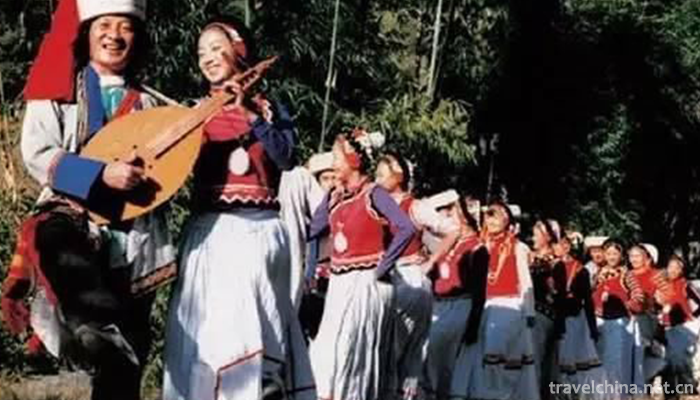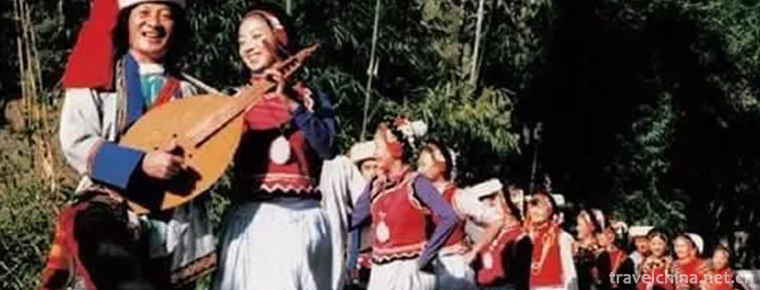Nu Dabian Dance
Nu Dabian Dance
"Dabian Dance" is one of the representative dances of the Nu nationality, which is spread in the Nujiang Lisu Autonomous Prefecture Fugong County Nu villages. Dabian dance is characterized by dancers holding "Dabian" while playing. "Dabiea" is a traditional instrument of Nu nationality, similar to Pipa and four strings. The upper body posture of Dabian dance is very rich, including left and right high, flat, low, back, rebound and so on. There are two main styles of dance steps: one is the knee flexion and extension belt to send the hip rhythm of foot, point, planer, negotiation; the other is the flexion and extension belt to turn the rhythm of foot, point, planer, negotiation, hook, negotiation, flexion and extension is relatively small. The other is the flexion and extension belt to turn the rhythm of foot, point, planer, negotiation, hook.
On November 11, 2014, Nu Dabian Dance was approved by the State Council to be included in the fourth batch of national intangible cultural heritage list.
information
The Dabian Dance of Nu Nationality is Provincial III-13. The rhythm of Dabian Dance is mostly at medium speed. The knee bends and stretches once per beat of music, which requires uniformity and tenacity. This has a certain relationship with the national character stability. The basic rhythm of flexion, extension and tremor in Dabian dance has detailed requirements in the folk. When artists teach, they first emphasize that the knee joint should not be stiff, but should have a sense of tremor. As for how to master rhythm, it is emphasized that the "heart" should be used when flexion and extension flutter, that is, internal feeling, not only external flutter. It is not difficult to see that their requirements for the basic rhythm of flexion, extension and tremor in Dabian dance are extremely strict.
In a word, the three main points of forming the unique rhythm of Dabian dance are the right and left crotch delivery, the right and left turn, and the flexion and extension tremor. They are also the main factors of forming the unique style of Dabian dance.
Characteristic
The content and steps of Dabian dance are basically the same in all villages. In some villages, there are two kinds of end action combination after some dances. We call them "end combination one" and "end combination two". When a dance is finished and a combination of the ends is added, the speed of music and dance will be accelerated, so that the dance will end in a more pleasant atmosphere.


-
1.Park hyatt Guangzhou
In Guangzhou Park Hyatt Hotel, a traditional Lingnan culture and Gourmet Tour is opened. Guangzhou Baiyue Hotel integrates Lingnan's long history and culture with Baiyue's delicate modern
Time 2018-12-16 -
2.Shenyang Weipo Skiing Ground
Shenyang Qiaopo International Skiing Resort is located in AAAA Scenic Area of Qiaopo in Shenyang, which is surrounded by mountains in the northeast direction and boundless forest sea.
Time 2019-02-08 -
3.Fengyang folk songs
Fengyang folk song is a traditional folk song in Anhui Province. Fengyang folk song in Fengyang flower drum is one of the important components of Fengyang folk song
Time 2019-04-29 -
4.GA Da Meilin
Gadamelin (1892 - April 5, 1931), Mongolian, surname Molettu (translated into Chinese as Meng), Nadamud, Han name Meng Qingshan, also known as Yexi, Mongolian legendary hero. Born in Zhelimu League
Time 2019-04-30 -
5.Sacrifice forest
Sacrifice to the gods of villages, as well as "Amaron" and "Pumatu" and other names, is a traditional festival of the Hani people, which takes villages as units and integrates reli
Time 2019-05-05 -
6.Miao Lusheng Dance
Lusheng dance, also known as "stepping on Lusheng" and "stepping on the singing hall", is named for its accompaniment and self-boasting dance. It spreads in the Miao, Dong, Buyi, S
Time 2019-06-05 -
7.Ping Ju Opera
Opera commentary is a kind of opera which is spread in the north of China. It is one of the most popular operas among the people and ranks among the five major Chinese operas. Some people once thought
Time 2019-06-09 -
8.The seafood tune of the Yi nationality
The seafood tune of the Yi nationality Shiping Yi seafood tune, also known as "Shiping tune" and "Quzi", is commonly known as "inverted paddle". It is named after a herba
Time 2019-07-12 -
9.Ban Zhao
Ban Zhao (about 45 years - about 117 years), also known as Ji, the word Hui ban. Fufeng An Ling (now northeast of Xianyang, Shaanxi), a historian and a writer of Eastern Han Dynasty. historian Ban Bi
Time 2019-09-11 -
10.Luodai Ancient Town
Luodai Ancient Town is located in Longquanyi District, Chengdu City, Sichuan Province, with a total area of more than 20000 square meters. Luodai Ancient Town is a national historical and cultural town and one of the five "Dongshan five fields" in Chengdu.
Time 2020-11-05 -
11.Huahu Lake
Huahu is located on the 213 national road between Ruoergai in Sichuan Province and Langmu temple in Gansu Province. It is a natural Haizi on the grassland of GER dam. Geer dam is the second largest grassland in China after Hulunbeir Grassland
Time 2020-11-07 -
12.Kangding yak meat
There are many wild medicines such as Fritillaria, Cordyceps and so on growing in these areas over 3500 meters. Yaks often eat these herbs, and their meat is incomparably delicious. After being killed, they can be roasted in brown sauce, stewed or dried in the cold
Time 2020-12-06